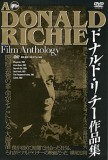| Reviews & Columns |
|
Reviews DVD TV on DVD Blu-ray 4K UHD International DVDs In Theaters Reviews by Studio Video Games Features Collector Series DVDs Easter Egg Database Interviews DVD Talk Radio Feature Articles Columns Anime Talk DVD Savant Horror DVDs The M.O.D. Squad Art House HD Talk Silent DVD
|
DVD Talk Forum |
|
|
| Resources |
|
DVD Price Search Customer Service #'s RCE Info Links |
|
Columns
|
|
|
Donald Richie Film Anthology, A
Now though thanks to Marty Gross Film Productions, the North American distributor of this disc from the Japanese avant-garde archival film label Image Forum Japan, I've had the opportunity to see six of some twenty shorts made by Richie. Completed between 1962 and 1968 on 16mm black-and-white film, these avant-garde works of narrative fiction are, with one exception, wordless.
The first three shorts in this anthology dabble in avant-garde technique but are more-or-less conventional narratives. Wargames (1962, 22 min.) presents a group of young boys on a beach squabbling about possession of a goat. When the clique of boys decamp following the animal's drowning, only a solitary outsider remains to witness the tides' tug of the carcass. The other short from 1962, Atami Blues (20 min.) is even more conventional, presenting the story of a young man seducing and then leaving a young woman at a seaside hotel. The most striking element of Atami Blues is the experimental jazz score by Tōru Takemitsu, who scored such other films as Kô Nakahira's Crazed Fruit, and Hiroshi Teshigahara's Woman in the Dunes. Rounding out the first three, the five-minute Boy with Cat (1966) presents a young man bent on masturbating who is repeatedly interrupted by the affections of his housecat.
The latter three films in this anthology are decidedly campy. Dead Youth (1967, 13 min.), the only story with dialogue (Japanese with English subtitles), concerns homosexual cruising and play, death, and graveside masturbation. At forty-seven minutes Five Filosophical Fables (1967) is the longest of the shorts, but it's really five discreet stories, two of which concern picnic cannibalism and public nudity, respectively. The final short in the set, Cybele (1968, 20 min.) is an arty hardcore S&M porno featuring six submissive men and a dominatrix. Although it's not 2 Girls 1 Cup, it's probably stronger stuff than most viewers might expect -- viewer discretion advised.
Presentation
For this review, the distributor provided a hand-labeled DVD-R with a black-and-white paper cover and inoperable menu controls. Though apparently NTSC-encoded and without regional restriction, it was unplayable on three of four DVD players tested (hence no screen grabs for this review). Presumably the quality of this screener differs from the actual commercial product.
Video:
With the exception of Boy with Cat which appears to be 8mm, the shorts included in this anthology appear to have been recorded on 16mm. The black-and-white image looks acceptable through print damage is noticeable.
Audio:
Though there is some tape noise, the 2.0 audio is of reasonable quality for '60s-era 16mm film.
It's not entirely clear from the screener reviewed, but it appears that on the commercial release Dead Youth is provided both with and without English subtitles.
Extras:
No extras were accessible on the screener provided though the commercial release purportedly includes introductory clips by Donald Richie for each of the films as well as a filmography.
Final Thoughts:
The $60 purchase price of A Donald Richie Film Anthology ($150 for institutions) strikes me as unacceptably high, but the value of avant-garde art of this kind is in the eye (and pocketbook) of the beholder.
|
| Popular Reviews |
| Sponsored Links |
|
|
| Sponsored Links |
|
|
| Release List | Reviews | Shop | Newsletter | Forum | DVD Giveaways | Blu-Ray | Advertise |
|
Copyright 2024 DVDTalk.com All Rights Reserved. Legal Info, Privacy Policy, Terms of Use,
Manage Preferences,
Your Privacy Choices | |||||||












